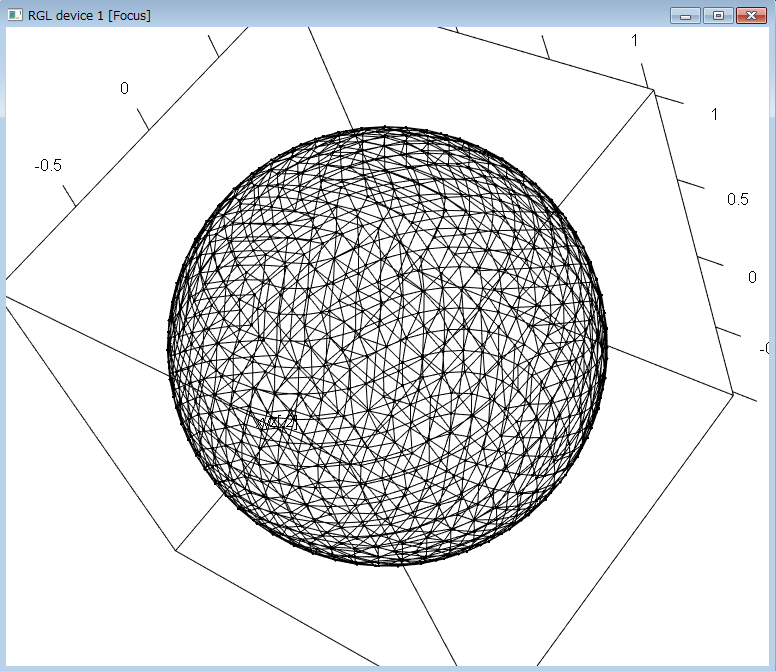- 曲面変形を基本形の球から、とすると、いろんな細かさの球面メッシュがほしい。自作する。

my.sphere.tri.mesh <- function(n.psi=30){
thetas <- list()
psis <- seq(from=-pi/2,to=pi/2,length=n.psi)
d.psis <- psis[2]-psis[1]
hs <- sin(psis)
rs <- sqrt(1-hs^2)
ls <- 2*pi*rs
n.thetas <- floor(ls/d.psis)
thetas[[1]] <- c(2*pi)
for(i in 2:(n.psi-1)){
thetas[[i]] <- seq(from=0,to=2*pi,length=n.thetas[i]+1)
thetas[[i]] <- thetas[[i]][-(n.thetas[i]+1)]
}
thetas[[n.psi]] <- c(2*pi)
sapply(thetas,length)
bridge <- list()
for(i in 1:(n.psi-1)){
a <- c(thetas[[i]],2*pi)
b <- c(thetas[[i+1]],2*pi)
bridge[[i]] <- matrix(c(1,1),1,2)
loop <- TRUE
while(loop){
n.r <- nrow(bridge[[i]])
id.a <- bridge[[i]][n.r,1] + 1
id.b <- bridge[[i]][n.r,2] + 1
if(id.a > length(thetas[[i]]) & id.b > length(thetas[[i+1]])){
if(id.a-1!=1 & id.b-1!=1){
bridge[[i]] <- rbind(bridge[[i]],c(1,id.b-1))
}
loop <- FALSE
}else{
if(id.a > length(thetas[[i]])){
tmp <- c(id.a-1,id.b)
}else if(id.b > length(thetas[[i+1]])){
tmp <- c(id.a,id.b-1)
}else{
if(a[id.a] < b[id.b]){
tmp <- c(id.a,id.b-1)
}else{
tmp <- c(id.a-1,id.b)
}
}
bridge[[i]] <- rbind(bridge[[i]],tmp)
}
}
}
xyz <- matrix(0,0,3)
edge <- matrix(0,0,2)
triangles <- matrix(0,0,3)
for(i in 1:n.psi){
n.r <- nrow(xyz)
if(i > 1){
pre <- (n.r-length(thetas[[i-1]])+1):n.r
post <- (n.r+1):(n.r+length(thetas[[i]]))
edge <- rbind(edge,cbind(post,c(post[-1],post[1])))
br <- bridge[[i-1]]
new.edge <- cbind(pre[br[,1]],post[br[,2]])
edge <- rbind(edge,new.edge)
tmp.tri <- cbind(new.edge,rbind(new.edge[-1,],new.edge[1,]))
tmp <- apply(tmp.tri,1,unique)
triangles <- rbind(triangles,t(tmp))
}
psi <- psis[i]
theta <- thetas[[i]]
xyz <- rbind(xyz,cbind(cos(psi) * cos(theta),cos(psi)*sin(theta),sin(psi)))
}
return(list(xyz=xyz,edge=edge,triangles=triangles))
}
library(rgl)
sp.mesh <- my.sphere.tri.mesh(35)
plot3d(sp.mesh$xyz)
segments3d(sp.mesh$xyz[c(t(sp.mesh$edge)),])
plot3d(sp.mesh$xyz)
mesh.tri <- tmesh3d(t(sp.mesh$xyz),t(sp.mesh$triangles),homogeneous=FALSE)
shade3d(mesh.tri,col="gray")
